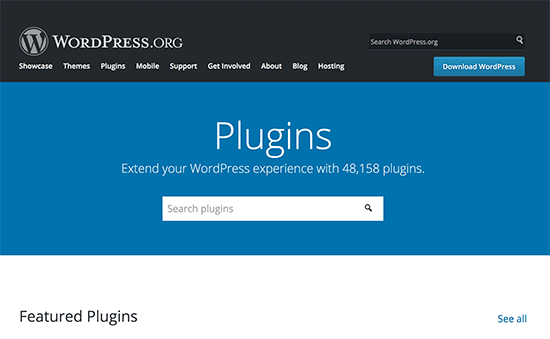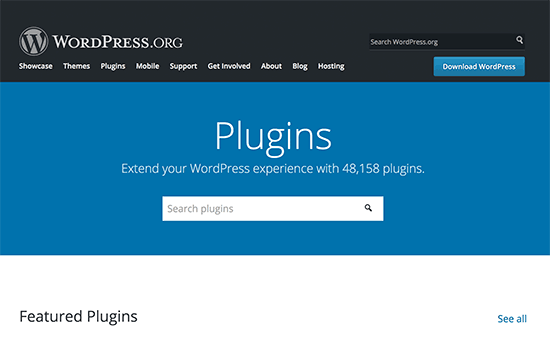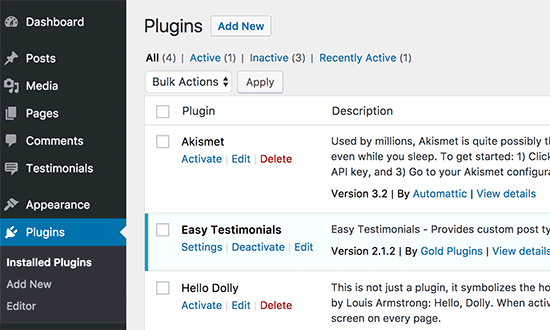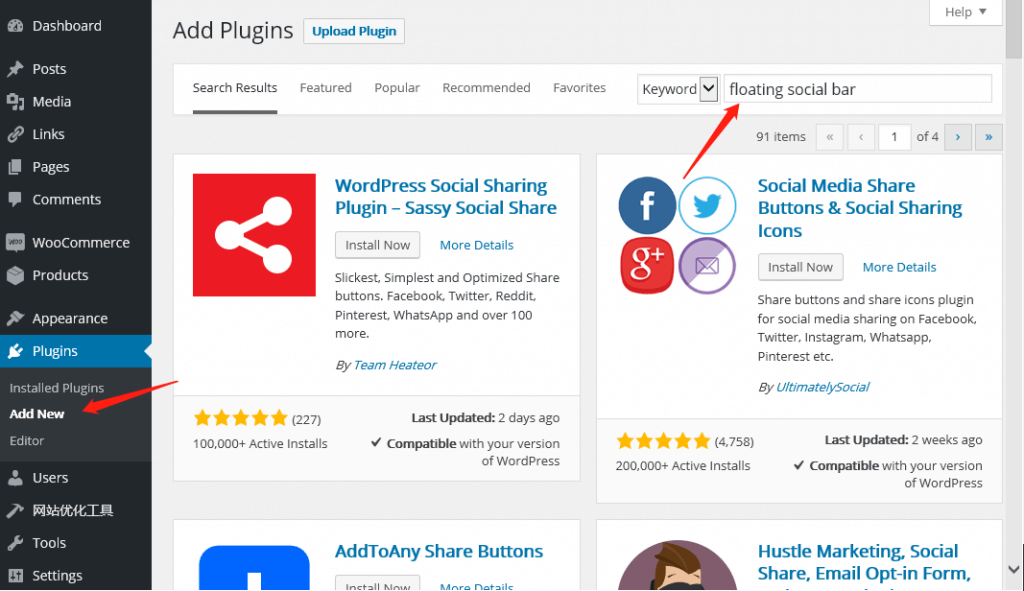Physical Address
304 North Cardinal St.
Dorchester Center, MA 02124

Often WP noobs will ask us what is a WordPress plugin and what is it for? Plugins are a very important part of the WordPress ecosystem. To build a high-quality WordPress website, plugins are essential. In this beginner’s guide, we’ll explain what a WordPress plugin is and how it works.
WordPress plugins are apps that let you add new functionality to your website, just like apps on your smartphone.

There are currently more than 48,000 free plugins available in the WordPress.org plugin directory. There are more plugins available from third-party websites, such as Github.
On top of that, there are thousands of paid WordPress plugins created by individual developers or companies.
In 2003, WordPress started as a simple tool to help you build a blog. Over the years, it has evolved into a powerful content management system and application framework, mostly thanks to plugins.
WordPress plugins are small software applications integrated and run on top of WordPress software that allow you to create almost any type of website based on WordPress.
For example, you can:
There is a popular saying in the WordPress community that “There is a plugin that can do this”.
Whatever you want to try to do with WordPress is possible. If WordPress doesn’t have this functionality by default, there are definitely plugins out there that do.
WordPress plugins can improve SEO, speed up your website, add contact forms, and social media buttons, create photo galleries, and more.
Plugins can be very small and only provide a small function (such as adding an image to the sidebar), or they can be very large and form a platform of their own (such as WordPress eCommerce or WordPress Membership plugin).
Many feature-rich plugins also have their own plugins to extend their functionality, just like you use plugins to extend the functionality of WordPress.
When WordPress was developed, it was guaranteed that other developers could add their own code. The WordPress plugin API provides a series of hooks and filters to allow developers to modify existing WordPress functions or add new ones.
WordPress also allows developers to store data in a database. Plugins can take advantage of WordPress content types, taxonomies, and custom fields that allow users to store different types of content, not just posts and pages.
Every installed WordPress plugin is registered in the database, and you can activate or deactivate them at any time.

Every time you visit the website, WordPress will connect to the database, load the core components, and then load the activated plugins. All these processes are processed on the server and then sent to the user’s browser.
You can find many free plugins in the plugin section of WordPress.org, or directly in the WordPress admin area.
Directly click “Plug-ins” >> “Install Plug-ins”, search for the name or function of the plug-in you want, you can filter out many, and click to install.

WordPress will search the plugin directory and display the available plugins. You can find the plugin you want to install in the list results and click the Install button next to it.

However, the search results in the WordPress management background are sometimes not very satisfactory, because these are free plugins. And it is difficult for most novices to decide which plug-in is the most suitable and best to use.
Another method is to go to some professional third-party websites to read recommended plug-ins and tutorial articles. These articles usually recommend some useful paid plug-ins or free plug-ins, as well as tests and reviews.
Why can’t I see or install plugins in my WordPress blog?
This is most likely because you are using WordPress.com, plugins are only allowed on self-hosted WordPress.org sites.
How many plug-ins to install are more?
A common statement among users is that using a high number of plugins will slow down your website. But the truth is that no amount of plugins will slow down your site, only plugins with poor code quality will slow down your site’s performance.
Can I install plugins that have not been tested on the version of WordPress I am using?
Sometimes, free plugin authors don’t update their plugins with every WordPress release. As long as the plugin works, they don’t feel the need to upgrade. So some can be installed, and some will have compatibility problems.
How to choose between free and paid plug-ins?
There are thousands of free plugins out there, and there is a good chance you will find one of the free plugins that offer the same functionality as the paid ones. If the feature meets your needs, use the free one.
But you need to know that free plugins come with no guarantees and no technical support. Plugin authors may stop development work at any time.
If you feel you need a lot of support, along with regular upgrades, go for the paid add-ons.
Both free and paid ones are in use on our website.
How do I get support for free plugins?
Free WordPress plugins do not come with a guarantee of support. However, most of the plugins with a large number of user installs offer limited free support on the official WordPress support forums. Just click the “Support” tab on the plugin page and post your question.
Hopefully, this article has given you an idea of what WordPress plugins are and how they work.